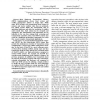Free Online Productivity Tools
i2Speak
i2Symbol
i2OCR
iTex2Img
iWeb2Print
iWeb2Shot
i2Type
iPdf2Split
iPdf2Merge
i2Bopomofo
i2Arabic
i2Style
i2Image
i2PDF
iLatex2Rtf
Sci2ools
117
click to vote
MICRO
2010
IEEE
2010
IEEE
A Dynamically Adaptable Hardware Transactional Memory
Most Hardware Transactional Memory (HTM) implementations choose fixed version and conflict management policies at design time. While eager HTM systems store transactional state in-place in memory and resolve conflicts when they are produced, lazy HTM systems buffer the transactional state in specialized hardware and defer the resolution of conflicts until commit time. Each scheme has its strengths and weaknesses, but, unfortunately, both approaches are too inflexible in the way they manage data versioning and transactional contention. Thus, fixed HTM systems may result in a significant performance opportunity loss when they execute complex transactional applications. In this paper, we present DynTM (Dynamically Adaptable HTM), the first fully-flexible HTM system that permits the simultaneous execution of transactions using complementary version and conflict management strategies. In the heart of DynTM is a novel coherence protocol that allows tracking conflicts among eager and lazy tra...
Related Content
| Added | 14 Feb 2011 |
| Updated | 14 Feb 2011 |
| Type | Journal |
| Year | 2010 |
| Where | MICRO |
| Authors | Marc Lupon, Grigorios Magklis, Antonio González |
Comments (0)

